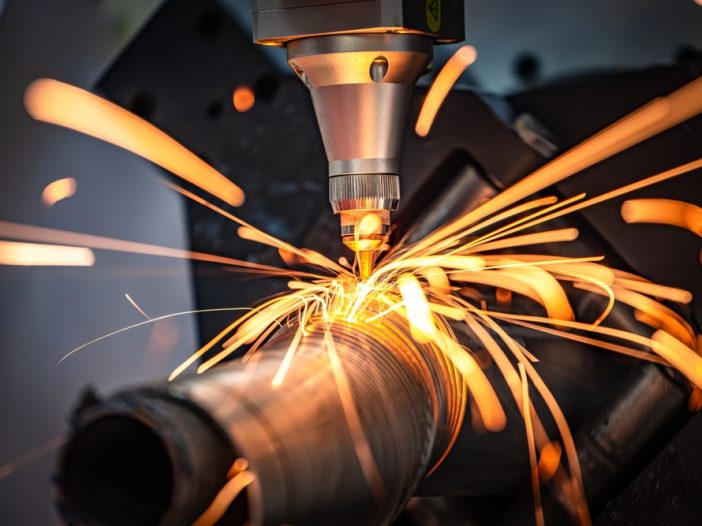
CNC machining can help you produce parts from any kind of plastic or metal. Due to this reason, there is a wide range of materials with which you can do CNC machining. To decide which will be the best for your application, you need to think about which of the CNC machining materials will be best for your use. Because of this, we have listed the top CNC machining materials that you can check out.
Best CNC machining materials
1. Aluminum
It is the most widely used among CNC machining materials. This is why it is a suitable option for both mechanical and aspect components. When you expose it to the environment, parts made up of aluminum change into a protective layer. It contributes to corrosion resistance and gets extra strength. In addition, it is quickly machined in comparison to other materials. This makes it economically viable.
Its benefits include good weldability and formability. Among its applications, it can be used in medical devices, shafts, gears, aircraft fittings, consumer electronics, and in healthcare.
2. Stainless steel
Stainless steel alloys are resistant and strong to corrosion, distortion, and wear. 303 stainless steel comprises sulfur for better machinability. However, this material comes with a few limitations that engineers must pay attention to.
It cannot be welded, cold-formed, or heat-treated. Some amount of special care needs to be taken with feeds or speed and sharpness of tools used for cutting at the time of CNC manufacturing. But, it is good for gears, bolts, nuts, shafts, and non-marine grade fittings.
304 stainless steel is all-purpose, non-magnetic steel that is popular for its toughness. It is corrosion-resistant and readily machinable, but you can weld it. Moreover, it is suitable for industrial and consumer applications. You can find more corrosion resistance in 316. Engineers need to test raw materials to check the characteristics of the particular steel they are using.
3. Titanium
Titanium has become revolutionary in almost all industries. It solves most of the problems of manufacturing industries. Alloys of titanium are corrosion-resistant, tough, lightweight, and strong. It can be best for aggressive conditions and is the noblest metal where other kinds of metals can fail.
The medical industry benefits a lot from titanium. This was when it was considered to be biocompatible. It is used in medical equipment as well as implantable components such as medical devices and screws. These alloys are extensively useful in the military, industrial, and aerospace sectors. It is mainly due to their good metallurgical structure, creep resistance, and superior quality of strength. Titanium is as strong as aluminum. As a consumer product, it is also quite popular.
4. Plastics
There are a number of choices in plastics, such as Polypropylene (PP), PVC, Acrylics (PMMA), Acetal, Polycarbonate (PC), and Nylon. These plastics are easily machinable and can be suitable for applications that need resistance to corrosion, less friction, and transparency of weight. Some of its benefits include impact strength, cost-effectiveness, dimensional stability, and good flame resistance. It can be used in automotive, bearings, insulators, electrical insulation, medical, aerospace, etc.
5. Carbon Steel
Carbon steel 1045 is milder than carbon steel. CNC manufacturers often use this material because it is not as expensive as stainless steel but is tougher and stronger. It is easily weldable and easy to machine; manufacturers can heat treat or harden it to get different degrees of hardness.
This material is best for small and strong mechanical parts, nuts, gears, connecting rods, bolts, and shafts. One can also use it for architectural applications, but it needs to be surface treated to prevent corrosion and rust.
6. Brass
It is another non-magnetic material that is used to create components that need electrical conductivity and strength applications. Brass parts also enhance the visual appeal while at the same time offering considerable strength. It is one of the most cost-effective and easiest materials to use for CNC machining.
Among its benefits, it is highly corrosion resistant, has low friction, and is resistant to most chemicals. It is good for use in medical equipment, electrical hardware, plumbing, engineering, and consumer goods.
7. Copper
Copper is a good thermal and electrical conductor. Pure copper does not have a high degree of suitability for CNC machining because of its higher malleability at colder temperatures and also due to its high ductility. But, a number of copper alloys are easier for CNC machines and have comparable electrical and thermal properties.
How to select the right CNC machining material?
Some of the steps that you need to follow while selecting the right CNC material are as follows.
1. You have to determine the material requirements. These can consist of thermal, mechanical, and material requirements along with the surface finishing and the cost. You must consider how you will be using the parts and the kind of environment that they will remain in.
2. You have to jot down some candidate materials that will meet most of the requirements of your design.
3. It is important to see which of your requirements is more important than the other, like the cost or the mechanical performance.
Final words
We have listed all the best materials you can use for CNC machining. If you want to select the most suitable CNC machining materials, you need to determine the requirement for which you will be using the CNC machining. Some of the materials that you can choose from are stainless steel, aluminum, plastic, copper, and brass. Aluminum is the most common among all these materials, and these are mostly used for different types of applications, and they also come with specific characteristics that can be suitable for different uses.
Xcentricmold is a website that can help you with the on-demand manufacturing process along with injection molding. It works with a team of expert engineers that create a cost-effective platform that can deliver your project in a high-quality manner so that it aligns with all of your requirements.